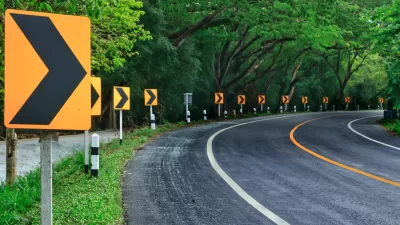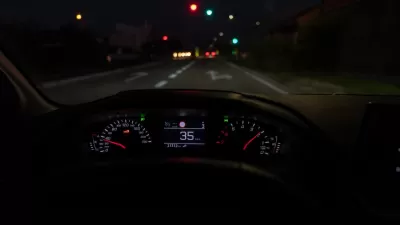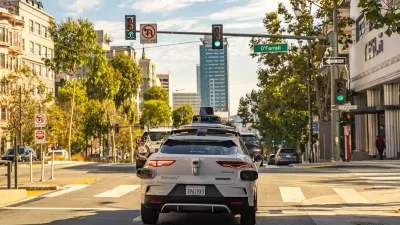Safety experts, like NHTSA, and safety advocates, like bicycle and pedestrian organizations, have replaced the commonly used "accident" with "crash" or similar nouns. Kevin Drum of Mother Jones asks if it really makes a difference.
Kevin Drum reacts to Emily Badger's, August 24 Washington Post Wonkblog piece, "When a car ‘crash’ isn’t an ‘accident’ — and why the difference matters."
While most traffic crashes may indeed be unintentional, Badger writes that safety advocates, like Amy Cohen, a co-founder of the New York-based group Families for Safe Streets whose 12-year-old died in a traffic crash in front of her home, and Transportation Alternatives, also in New York, "launched a campaign soliciting pledges to stop using the word."
Language, they believe, shapes policy. The word "accident," they say, presupposes a conclusion that no one bears responsibility.
In short, safety advocates are less concerned about whether a crash was intentional than whether it was preventable. Distinguishing between accident and crash dates to a 1997 campaign launched by the nation's premier traffic safety experts, the National Traffic Safety Administration (NHTSA). Scroll down to the Transportation Public Health Link (TPH Link) to "Setting the Record Straight on Terminology: Accident vs. Crash."
"Changing the way we think about events, and the words we use to describe them, affects the way we behave," wrote Pamela Tatiana Anikeeff, Ph.D., NHTSA Senior Behavioral Scientist, on August 11, 1997, describing their new "crashes are not accidents" campaign.
Motor vehicle crashes and injuries are predictable, preventable events. Continued use of the word “accident” promotes the concept that these events are outside of human influence or control....
That is not to say that accidents never happen when it comes to driving. NHTSA reserves the term for "acts of God," often referred to as "freak accidents," such as a tree falling on a vehicle.
Drum of Mother Jones disagrees. He sticks with "unintentional" as being key. But the advocates note that with other unintentional mishaps, even more severe than car crashes, we don't use accident. The pledge states:
Planes don’t have accidents. They crash. Cranes don’t have accidents. They collapse. And as a society, we expect answers and solutions.
Even one form of traffic crash is no longer called an accident—when caused by drunk driving, due to the good work of Mothers Against Drunk Driving (MADD) and other safety groups.
"Traffic is an outlier here, an environment where we still behave as if some level of carnage is unavoidable, explained away with the same logic we might use to describe bad weather," writes Badger. "Hurricanes happen. Traffic accidents do, too."
The advocates have an uphill battle. After the horrific Metro North commuter train crash with an SUV that stopped on a train crossing in Valhalla, N.Y. in February that killed six people, N.Y. Gov. Andrew Cuomo told NY1 News, "Sometimes accidents just happen...Someone made a mistake and stopped on the tracks."
The National Transportation Safety Board (NTSB), not part of the U.S. Department of Transportation, didn't sign-on to the NHTSA campaign. It continues to use the term 'accident. In their preliminary report of the above Highway-Railroad Grade Crossing Collision," they refer to it as an accident. No blame was assigned in their executive summary.
FULL STORY: "Crash" vs. "accident" doesn't seem like it matters very much - Aug 24

Florida Considers Legalizing ADUs
Current state law allows — but doesn’t require — cities to permit accessory dwelling units in single-family residential neighborhoods.

Manufactured Crisis: Losing the Nation’s Largest Source of Unsubsidized Affordable Housing
Manufactured housing communities have long been an affordable housing option for millions of people living in the U.S., but that affordability is disappearing rapidly. How did we get here?

HUD Announces Plan to Build Housing on Public Lands
The agency will identify federally owned parcels appropriate for housing development and streamline the regulatory process to lease or transfer land to housing authorities and nonprofit developers.

EPA Terminates $116 Million in Grants for Reducing Emissions from Construction Materials
C-MORE grants were earmarked for industry trade groups and universities.

BART Closes $35 Million Deficit
Cost control and revenue generation measures prevented service cuts.

The New Parisian Hearse is a Bicycle
Sleek, silent, and sustainable, a green trip to the graveyard has hit the streets of the French capital.
Urban Design for Planners 1: Software Tools
This six-course series explores essential urban design concepts using open source software and equips planners with the tools they need to participate fully in the urban design process.
Planning for Universal Design
Learn the tools for implementing Universal Design in planning regulations.
City of Moreno Valley
Institute for Housing and Urban Development Studies (IHS)
City of Grandview
Harvard GSD Executive Education
City of Piedmont, CA
NYU Wagner Graduate School of Public Service
City of Cambridge, Maryland





























